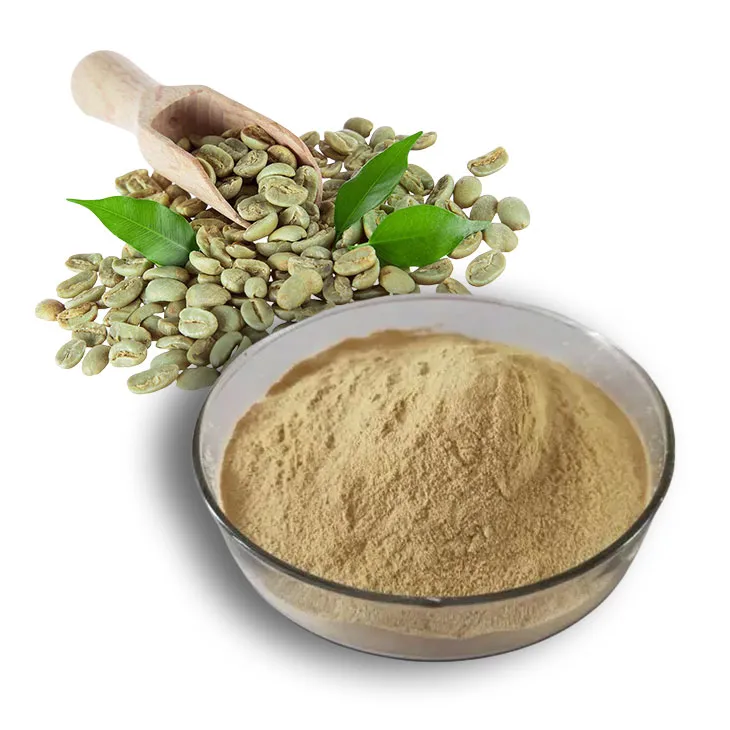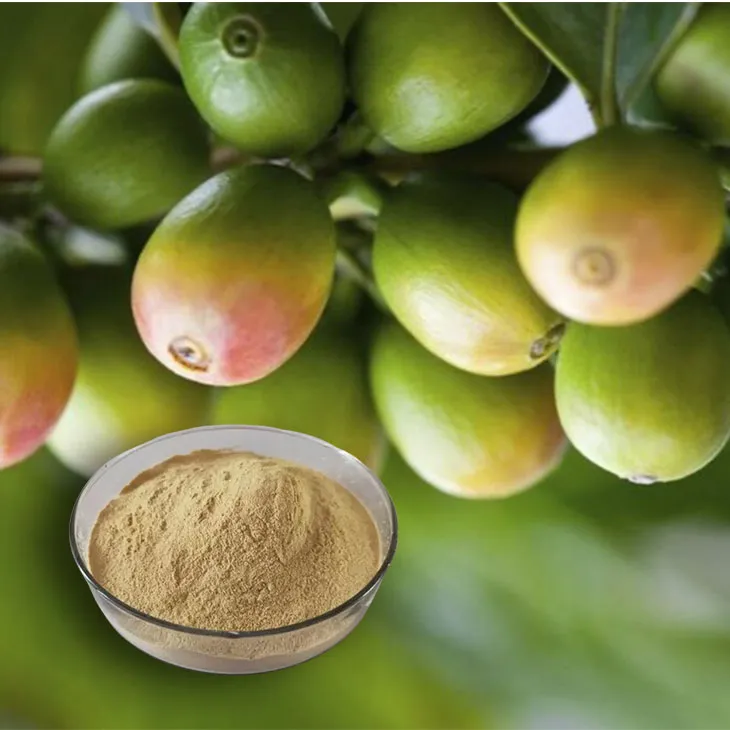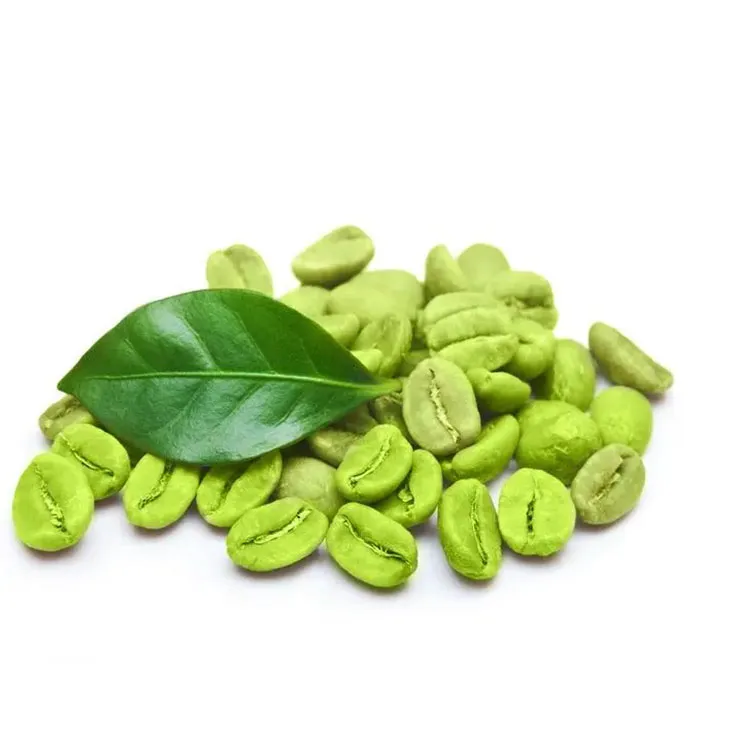- 0086-571-85302990
- sales@greenskybio.com
Green coffee bean extract can reduce high blood pressure.
2024-11-13

Introduction
High blood pressure, also known as hypertension, is a widespread health concern globally. It is a major risk factor for various serious health complications, including heart disease, stroke, and kidney failure. In recent years, Green coffee bean Extract has emerged as a potential natural remedy for reducing high blood pressure. This extract is derived from unroasted coffee beans and contains a variety of bioactive compounds that may have beneficial effects on blood pressure regulation.

Bioactive Compounds in Green coffee bean Extract
The main bioactive compounds in Green coffee bean Extract are chlorogenic acids (CGAs). These are a group of phenolic compounds that are present in high concentrations in unroasted coffee beans. CGAs have been shown to possess antioxidant, anti - inflammatory, and anti - hyperglycemic properties. In relation to blood pressure, they may act through multiple mechanisms.
Mechanism 1: Vasodilation
One of the ways in which CGAs may lower blood pressure is by promoting vasodilation. Vasodilation refers to the widening of blood vessels, which reduces the resistance to blood flow. This can lead to a decrease in blood pressure. CGAs may stimulate the production of nitric oxide (NO) in the endothelial cells lining the blood vessels. NO is a potent vasodilator that relaxes the smooth muscle cells in the vessel walls, allowing the vessels to dilate.
Mechanism 2: Renin - Angiotensin - Aldosterone System (RAAS) Modulation
The RAAS is an important hormonal system involved in blood pressure regulation. CGAs may interfere with the RAAS by inhibiting the activity of the enzyme renin. Renin is responsible for the conversion of angiotensinogen to angiotensin I, which is then further converted to angiotensin II. Angiotensin II is a powerful vasoconstrictor that also stimulates the release of aldosterone, a hormone that promotes sodium and water retention. By inhibiting renin, CGAs can disrupt this cascade and lead to a reduction in blood pressure.
Mechanism 3: Anti - Inflammatory Effects
Chronic inflammation has been associated with hypertension. CGAs' anti - inflammatory properties may play a role in reducing blood pressure. Inflammatory mediators can cause endothelial dysfunction, which impairs the normal regulation of blood vessels. By reducing inflammation, CGAs can help to maintain the integrity and function of the endothelial cells, thereby contributing to better blood pressure control.
Research on the Antihypertensive Effects of Green Coffee Bean Extract
Several studies have been conducted to investigate the potential of green coffee bean extract to lower high blood pressure.
Animal Studies
In animal models of hypertension, green coffee bean extract has shown promising results. For example, in rats with induced hypertension, treatment with green coffee bean extract led to a significant decrease in blood pressure compared to control groups. These studies have provided valuable insights into the possible mechanisms by which the extract may act on blood pressure. However, it is important to note that results from animal studies may not always be directly translatable to humans.
Human Clinical Trials
There have also been some human clinical trials examining the antihypertensive effects of green coffee bean extract. In a small - scale study, participants with mild to moderate hypertension were given green coffee bean extract supplements for a certain period. The results showed a modest reduction in blood pressure levels. However, more large - scale and long - term clinical trials are needed to confirm these findings and to establish the optimal dosage and treatment duration.
Factors to Consider
While green coffee bean extract shows potential in reducing high blood pressure, there are several factors that need to be carefully considered.
Dosage
Determining the appropriate dosage of green coffee bean extract is crucial. Too low a dosage may not produce the desired antihypertensive effects, while too high a dosage may lead to potential side effects. Currently, there is no consensus on the optimal dosage, and it may vary depending on factors such as individual differences in metabolism and the severity of hypertension.
Quality of the Extract
The quality of green coffee bean extract can vary significantly among different products. Factors such as the source of the coffee beans, the extraction method, and the presence of contaminants can affect the potency and safety of the extract. It is important to choose a high - quality extract from a reliable source to ensure its effectiveness and safety.
Potential Interactions with Medications
Green coffee bean extract may interact with certain medications. For example, it may enhance the effects of blood - thinning medications, increasing the risk of bleeding. It may also interact with medications used to treat hypertension, such as diuretics or beta - blockers. Therefore, individuals taking medications should consult their healthcare provider before starting green coffee bean extract supplementation.Green Coffee Bean Extract as a Complementary Approach
Green coffee bean extract could potentially be used as a complementary approach in the management of high blood pressure. However, it should not replace conventional medical treatment.
Lifestyle Modifications
Alongside any potential use of green coffee bean extract, lifestyle modifications remain fundamental in the control of high blood pressure. These include a healthy diet rich in fruits, vegetables, and whole grains, regular physical activity, smoking cessation, and moderation in alcohol consumption. Lifestyle changes can have a significant impact on blood pressure and should be the first line of defense in hypertension management.
Combination with Conventional Treatment
In some cases, green coffee bean extract may be used in combination with conventional antihypertensive medications. However, this should be done under the supervision of a healthcare provider. The combination may potentially enhance the overall effectiveness of blood pressure control, but careful monitoring is required to avoid any adverse effects.Conclusion
Green coffee bean extract has shown potential in reducing high blood pressure through its bioactive compounds and multiple mechanisms of action. However, more research, especially large - scale clinical trials, is needed to fully understand its efficacy and safety. When considering the use of green coffee bean extract for blood pressure management, factors such as dosage, quality, and potential interactions with medications must be taken into account. While it may be a complementary approach, it should not replace established medical treatments for hypertension. Overall, the exploration of green coffee bean extract as a natural remedy for high blood pressure is an exciting area of research that holds promise for future developments in the field of hypertension management.
FAQ:
What are the bioactive compounds in green coffee bean extract that may affect blood pressure?
Green coffee bean extract contains compounds such as chlorogenic acid. Chlorogenic acid is thought to have antioxidant and anti - inflammatory properties. It may act on the renin - angiotensin - aldosterone system (RAAS), which is an important regulator of blood pressure. By influencing this system, it can potentially help in reducing blood pressure.
How does green coffee bean extract compare to traditional blood pressure medications?
Traditional blood pressure medications are often well - studied and have a clear mechanism of action for directly controlling blood pressure. Green coffee bean extract, on the other hand, is a natural supplement. While it may have potential in reducing blood pressure, its effects may not be as strong or immediate as medications. Also, medications are usually prescribed based on a person's specific medical condition and risk factors. Green coffee bean extract may be considered as a complementary option rather than a replacement for traditional treatments.
What is the recommended dosage of green coffee bean extract for blood pressure reduction?
There is no one - size - fits - all recommended dosage yet. Dosage may vary depending on factors such as a person's age, overall health, and the severity of their high blood pressure. Some studies have used different dosages in their experiments. However, it is crucial to consult a healthcare provider before starting to take green coffee bean extract for blood pressure control, as improper dosage may lead to unwanted side effects or lack of effectiveness.
Can green coffee bean extract cause side effects when used for blood pressure management?
Yes, it can potentially cause side effects. Some people may experience gastrointestinal issues like stomach upset, diarrhea, or acid reflux. Also, since it may interact with other medications, it could lead to unforeseen consequences. For example, if a person is taking medications for blood pressure already, the combination with green coffee bean extract might cause an excessive drop in blood pressure or other adverse reactions. That's why it is so important to consult a doctor before using it.
How long does it take for green coffee bean extract to show effects on blood pressure?
The time it takes for green coffee bean extract to show effects on blood pressure can vary. Some people may notice a difference within a few weeks, while for others it may take longer. It depends on factors such as individual metabolism, the initial level of blood pressure, and the consistency of taking the extract. However, it should be noted that these effects are not guaranteed and more research is needed to accurately determine the time frame.
Related literature
- The Antihypertensive Effects of Green Coffee Bean Extract: A Review of Current Evidence"
- "Green Coffee Bean Extract and Blood Pressure Regulation: Mechanisms and Clinical Implications"
- "Bioactive Compounds in Green Coffee Beans and Their Impact on Cardiovascular Health, Particularly Blood Pressure"
- ▶ Hesperidin
- ▶ citrus bioflavonoids
- ▶ plant extract
- ▶ lycopene
- ▶ Diosmin
- ▶ Grape seed extract
- ▶ Sea buckthorn Juice Powder
- ▶ Beetroot powder
- ▶ Hops Extract
- ▶ Artichoke Extract
- ▶ Reishi mushroom extract
- ▶ Astaxanthin
- ▶ Green Tea Extract
- ▶ Curcumin Extract
- ▶ Horse Chestnut Extract
- ▶ Other Problems
- ▶ Boswellia Serrata Extract
- ▶ Resveratrol Extract
- ▶ Marigold Extract
- ▶ Grape Leaf Extract
- ▶ blog3
- ▶ blog4
- ▶ blog5
-
Organic Tongkat Ali extract powder factory.
2024-11-13
-
How to make powder with ashwagandha extract.
2024-11-13
-
Rosehip extract manufacturers from China.
2024-11-13
-
The best cat's claw extract in nature.
2024-11-13
-
Chinese Dandelion Leaf Extract Suppliers.
2024-11-13
-
Honeysuckle Pollen
2024-11-13
-
Moringa powder
2024-11-13
-
Cranberry Extract
2024-11-13
-
Yohimbine Bark Extract
2024-11-13
-
Pueraria Lobata Extract
2024-11-13
-
Berberis aristata Extract
2024-11-13
-
Wheat Germ Extract
2024-11-13
-
Passionflower Extract
2024-11-13
-
Lotus leaf extract
2024-11-13
-
Apricot Powder
2024-11-13





















